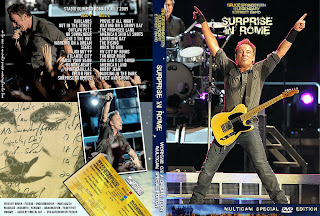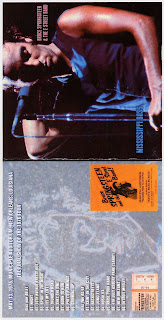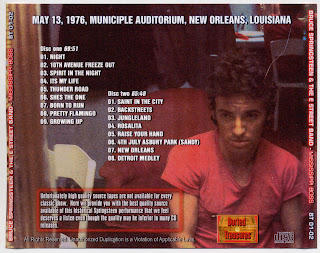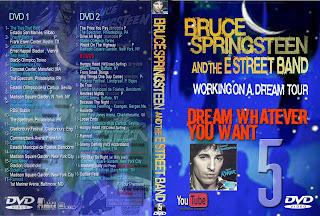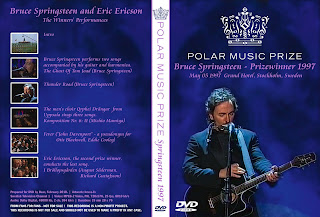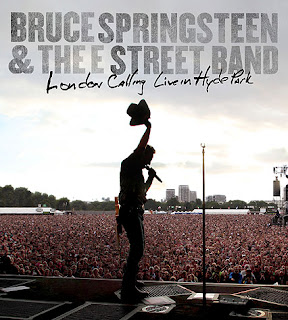Articolo vecchio e molto lungo questo su Springsteen tratto dal numero di Creem dell’ ottobre 1978.
Se qualcuno degli iscritti al blog è interessato glielo posso mandare per email.
Buona lettura.
The middle-aged white man who runs the biggest oldies shop in the very old city of
New Orleans is ranting hysterically on the edge of tears. He has recently seen the
movie American Hot Wax and senses that history has passed him by.one last time.
“That’s right. I was a disk jockey in Canton, Ohio when Alan Freed was a d.j. in Akron.
I was playing nigger records, and you know what Alan Freed was playing??? He was
playing country & western! Country & western music! Then he starts playing nigger
records and they fire him after a day. One day!
“Well, I’m sitting in this coffee shop with him afterwards, and he’s stirring his coffee
real slow and looking over my shoulder out the window. I says to him, ‘Alan, just look
at what you’re doing. ‘ And he says, ‘What?’ And I say, ‘Alan, you’re stirring your
goddamn coffee with a spoon! And there’s the cream and sugar sitting right over
there and you haven’t put a one of them in!’
“Then I tell him that I’m just going to have to write his next contract for him and that
he’s not going to get fired no more! A no-fire contract! I told him that you got to ask
for what you want ’cause if you don’t, they figure you ain’t worth nothing anyway!
And I did it! I did the contract! I did his contract! Listen to me! I created Alan Freed!!!
Did you read that in the history??? Did you see that in the goddamn movie??? I said,
Did you see that in that goddamn movie???”
And he falls into a little red-faced jig behind his cash register with one arm stretching
forward to detain us further and the other stretching beseechingly towards the sky.
All we asked was how much for a Huey Smith record.
Several hundred miles up the road from New Orleans, in an empty, hermetically
modern conference room that is acutely air conditioned against the buttery summer
air, Bruce Springsteen, who’s never met the white man in New Orleans, tells me what
he has been thinking about.
“lt’s a real simple story. You grow up, and they bury you. They keep throwing dirt on
you, throwing dirt on and dirt on and dirt on, and some guys they bury so deep they
never get out. Six foot, twelve foot down . Other guys, something comes along and
they’re able to get some of it away. They get a hand free or they get free one way or
another.
“I don’t think you ever really blow it all off, but the idea is to keep charging. It’s like
anything. Everybody can’t make it. You can see the guys on the street who aren’t
going to make it, and that’s a frightening thing.
“That’s what I’m talking about. That some people get dug in so deep that there’s a
point where it stops getting shovelled on them and they roll over and start digging
down. They literally roll over and start digging down themselves. Because they don’t
know which way is up. You get down so deep that you don’t know which way’s up.
You don’t know if you’re digging sideways, up, down, you don’t know . . until
something comes along, if you’re lucky, and shakes you ’til all of a sudden you have a
certain sense of direction and at least know where you’re going.
“A lot of people don’t ever get that. You go into the bars and you see the guys
wandering around in there who got the crazy eyes. They just hate. They’re just
looking for an immediate expenditure of all this build-up. They’re just screaming to
throw it all off. But you can’t and it turns into, like, death throes. A guy walks into a
bar, a little guy, and he walks up to another guy, a dome, and the little guy’s looking
to get creamed. Looking to get massacred. He wants to. ‘Look,’ he’s saying, ‘I’m dying
here and I don’t know what the fuck to do.’ It’s a scary thing when you see the guys
that ain’t gonna get out, just ain’t gonna get out.
“But I guess it comes down to . . . You just see too many faces, you just see too many .
. It’s a funny kind of thing. It’s the kind of thing where you can’t save everybody, but
you gotta
I remember the guy in New Orleans and how his herky-jerky movements and his nearweeping
are less like death throes than like the throes of postdeath, the confused,
bizarre, parodistic behavior of a dead body responding to the last garbled signals of
the brain. It seems a remarkable burden for Bruce Springsteen to have to “try” with
this guy. But Bruce is radiant in the sense of his mission these days, reminding me of
no one so much as Catcher In The Rye’s Holden Caulfield, whose similar passion
steered him straight to the nuthouse .
Bruce has never read the book, so I tell him about the key scene where Holden tells his
baby sister Phoebe. Says Holden:
“You know what I’d like to be? I mean if I had my goddamn choice?”
“What? Stop swearing.”
“You know that song, ‘If a body catch a body comin’ through the rye’? I’d like—”
“It’s ‘If a body meet a body coming through the rye’!” old Phoebe said. “It’s a poem by
Robert Burns.”
“I know it’s a poem by Robert Burns. “
She was right, though. It is “If a body meet a body coming through the rye.
“Idin’tknow it then, though.
“I thought it was ‘If a body catch a body,’ ” I said. “Anyway, I keep picturing all these
little kids playing some game in this big field of rye and all. Thousands of little kids,
and nobody’s around—nobody big, I mean—except me. And l’m standing on the edge
of some crazy cliff. What I have to do, I have to catch everybody if they start togo
ouer the cliff—I mean if they ‘re running and they don ‘t look where they ‘re going I
have to come out from somewhere and catch them. That’s all I’d do all day. I’d just be
the catcher in the rye and all. I know it’s crazy, but that’s the
only thing I’d really like to be. I know it’s crazy . ” ‘ “Wow,” says Bruce when I finish
telling him the story. “That’s wild.”
t t t
Three years ago, Bruce Springsteen, a nice boy who loved rock ‘n’ roll more than
anything, was dragged into the ugly and brutal fluorescence of American celebrity.
For all his naivete (that same naivete that allowed him, for one thing, to love rock ‘n’
roll so much when everybody else had given up andgotten a job), and perhaps
because of
it, he bore up under the relentless scrutiny, managing in the process to acquit himself
remarkably well during his first big league rock ‘n’ roll tour. In the meantime, his
record company made hay from his new celebrity and hustled his Born To Run album
to number one on the charts and eventually to platinum sales figures. And, so, three
years ago a “superstar” was born; surely, the poet must die.
Darkness On The Edge Of Town took eleven months to record. Legal disputes of the
kind that tend to accrue to anyone who is suddenly rich and famous occupies the
remainder of his over two year layoff. But what appears to have really happened
during this period is that Bruce Springsteen stood back, took stock of his world both
in and, more importantly, out of rock ‘n’ roll, and focused back on his career with a
newly keen and powerful vision, becoming more the artist than ever. This talent no
longer overwhelms him on Darkness but is harnessed fully to a coherent, usually
incisive, and definitely more mature view of the world. “This album’s stripped down,”
Springsteen says, “to run as clean as possible and stay true.”
Paradoxically while it is stripped down, it is also more complete. Where there was
once only hope, now there is also warning. Where he once dealt only with
youthfulness and “kids,” he now also deals with age (“Racing In The Street”) and
parents (“Factory,” “Adam Raised A Cain”). Where everything used to be about
movement, the faster the better, now there is a concern with standing still and stiller
(“Factory,” “Streets Of Fire”). Where a sense of community was all-important, with
Spanish Johnny and the Magic Rat and Puerto Rican Jane and Eddie and a whole host
of people crisscrossing one another’s lives, now a man stands alone on a hill, having
lost everything and everyone, in “Darkness On The Edge Of Town.” Where he once put
certain things into occasionally inadequate words, now he knows to wail wordlessly.
Not that Bruce has forsaken the highway, the kids, the gang, the words, or any of
that, just that on this new album these concerns have unfolded to reveal their many
facets, their true intricacies and subtleties. “Darkness,” says Springsteen, “is a
confrontation with a lot of things. Born To Run had a certain romantic feel. This is
more realistic.”
But realistic is a misleading description. There’s nothing cold and hardedged about
Darkness. The realism here is more naturalism or social realism, realism with a
purpose beyond the mere representational, something along the lines of what the
WPA artist of the 30’s employed to inspire the common man from his massive
malaise. No doubt, there is a reformer, a helper at work on this record and one who
seems especially driven to the task by deep spiritual connections. I ask Springsteen if
he feels religious.
“Yeah, well, but not in the organized way,” he responds. “I was raised Catholic and
everybody who was raised Catholic hates religion. They hate it, can’t stand it. It’s
funny, I went to a funeral the other day and all my relatives were there and we got to
talking about it. It’s a funny thing, they’re all in their thirties, my sister and all, and
they all feel the same way I do. But their kids go to Catholic school and to church
every Sunday. They’re really under the gun to this Catholic thing.
“I quit that stuff when I was in eighth grade. Bythe time you’re older than 13 it’s too
ludicrous to go along with anymore. By the time I was in eighth grade I just lost it all.
I decided to go to public high school, and that was a big deal. If you got up in eighth
grade class and said that next year you were going to Freehold Regional it was like . . .
‘Are you insane??? You are dirt! You are the worst! You’re a . . . barbarian!’ ” He gives
a short laugh.
I tell him that what I wanted to get at is where the idea for a song like “Adam Raised
A Cain” came from.
Springsteen explains: “I did read the Bible some. I tried to read it for a while about a
year ago. It was great. It’s fascinating. I got into it quite a ways. Great stories.
Actually, what happened was I was thinking of writing that particular song, and I went
back trying to get a feeling for it.”
Elsewhere Bruce has mentioned The Grapes Of Wrath (speaking of social realism and
religious allegory) as having been a source of inspiration for Darkness. He readily
volunteers that the movie was “one of the big influences,” but waxes a bit guilty when
asked about the book. “I haven’t read it yet,” he says, adding quickly, “but I’ve got it
in my suitcase. I have got it.
“The movie affected me a lot. It brought up a lot of questions I didn’t think about
before. There’s the great part where he’s coming back from prison and he finds that
little guy hiding in the closet. Little guy says, ‘They’re coming.’ ‘Well, who’s coming?’
‘They’re coming. Taking away all the land.’ And then the guy comes on the tractor
and it’s their friend. They ask him, ‘Who’s doing this?’ And the tractor guy just says,
‘Well, I got my orders from this guy and it goes back to him.’
“To me, it’s like, Where do you point the gun? There’s no place to take aim. There’s
nobody to blame. It’s just things, just the way. Whose fault is it? It’s a little bit of this
guy, a little bit of that guy, a little bit of this other guy. That was real interesting to
me . . . And it was great that when that movie came out it was a very popular movie.”
As I write, Darkness is an immensely popular record.
Darkness On The Edge Of Town is not a tour de force like Born To Run. That could
never be because the things on Darkness and in Bruce Springsteen have become too
complex, too ambiguous. The album is a transitional piece, in two ways. It is
transitional as far as content in that it is a questioning of the old values and a
broadening towards the new; it is transitional as far as Springsteen’s car,eer goes
because it marks a full ripening of his artistic powers and the emergence as well of a
serious social conscience
Bruce is telling me why he likes touring. “Home never had a. big attraction for me. I
get excited staying in all these different hotels, in a whole lot of rooms. I’m always
curious what the wallpaper’s gonna be like. Do I have a big bed or a little one? And
what’s this funny painting? Always a sense of transition.” Darkness is a transitional
record because Springsteen is devoted to the transition that is living.
t t t
I was on the road three days andnights with Bruce Springsteen and the E Street Band,
and that’s about as good a time stand in which to hold a resurrection as I can think
of. The problem is I don’t know who exactly was more resurrected Bruce and the
band or me. Southsile Johnny once spoke glowingly of Bruce in terms of “charisma.”
But charisma has the odor of the secular. After what I saw, heard
and felt, I’m looking for a word that’s something more in the religious price range.
And maybe three conhrmed miracles.
No sweat. It’s 100 degrees in Houston in July. The death toll from the Texas heat has
topped 20 persons and is still rising and Bruce Springsteen is not sweating at the
intermission of his titanic three-hour show. Now, some among our rock stars would
approach such an accomplishment from the obvious direction—e.g. no effort, no
sweat. But not Springsteen. “I’m jumping around and there’s oceans of sweat coming
off my arms and face and all of a sudden . . . no more sweat! I feel my face, bone dry.
I guess I just got no more. Weird.”
And then he went out for another hour and a half.
Having not seen Springsteen and the band perform for nearly two years, what initially
strikes me my first night on the road—besides the fact that the new ,ongs sound
great, besides the fact that he does superior versions of both “Fire” and “Because The
Night,” besides the fact that the band is as tight and expressive a rock ‘n’ roll unit as
I’ve ever seen, besides the fact that Clarence has achieved such elegance, such
authority on stage and on the sax that he more than fills his billing as “King of the
World,” besides all that and much, much more—is simply the fact that the set is so
gruelling and the tour is so long. No sweat, no wonder.
In Houston, it occurs to me that Springsteen’s rap in the middle of “Growin’ Up” is
sort of-the glue that binds them. He talks about the days when he and Steve were
playing around Asbury, waiting to be discovered, how they can’t figure out what the
missing X factor is and how the exmanager of the Byrds and the exmanager of so and
so have all said they’ll come down and see them and so forth. Eventually, Bruce winds
it around to Clarence descending from a spaceship to make the band complete. Space
travel aside, it’s clear that this is pretty much the way it was with this band (indeed,
what band didn’t count on the helping hand of the friend of a friend of an exmanager
sometime?), and that reciting the story, remembering their humble
beginnings, their shared past, provides a sense of—if you’ll pardon me—roots. That,
along with love.
As if to confirm my theory, Bruce later tells me another story about the early days
when they first travelled to Boston and were staying in the attic of a friend’s house
where there were only four mattresses. “So every night after the gig we had to try and
figure out whose turn it was to sleep on the floor.” He laughs. “But it really didn’t
matter. The guys were great. They’re guys who you can go through that sort of stuff
with. It was never a down. Me and Steve would always sit back and say, ‘As bad as this
is right now, it will never be as bad as it was before we made an album or got a break.’
Who are we to complain? Thisis Easy Street. I’m lucky number one. So are all those
guys. A bunch of lucky jokers. It’s a lot of work, but you’re doing something you like.
We always considered ourselves to be way in front with the whole ball game.
“I know what it’s like not to be able to do what you want to do, ’cause when I go
home that’s what I see. It’s no fun. It’s no joke. I see my sister and her husband.
They’re living the lives of my parents in a certain kind of way. They got kids, they’re
working hard. They’re just real nice, real soulful people . These are people you can
see something in their eyes. It’s really something. I know a lot of people back there . .
.” The picture looms vivid in his mind, so does what can only be described as his
mission. “That’s why my album, a big part of it, is the way it is. It’s about people that
are living the lives of their parents, working two jobs . . . It’s also about a certain
thing where they don’t give up . I asked my sister, ‘What do you do for fun?’ ‘I don’t
have any fun,’ she says. She wasn’t kidding . . . I’m just really thinking about a whole
lot of things.”
He thinks at this hands for a moment. “A whole lot of stuff went down on me in the
last year or two and then I was around home a lot and there was a lot of stuff going
on with the people I was friends with back there and I see it from all sides. Which is
why I can’t go out on stage at night and not try and bring it home. Because . . . what
an ingrate??? What a spit in the face of everything that is anything??? I could never do
that. I’d rather get thrown off the bus. They should throw me off the bus at 60 m.p.h.
‘You don’t belong in the bus!’ It’s funny when I read something I say about this stuff. I
always sound like some kind of fanatic some kind of zealot. But I think there’s things
that people take for granted. How can you take it for granted? I stick too close to the
other side to know what’s real about this side. And I still got too many people who
are close to me who are still living on that other side.”
The Bruce Springsteen tour rolls on into New Orleans in a sort of time warp trip from
Houston, a forbidding city of the future, into this forbidden city of the past. “Who
you got in here?” the cop who lolls about the lobby of our French Quarter hotel asks
the desk clerk watching the unusual activity. “Bruce ‘Springstein,’ ” drawls the clerk,
adding in his mind no doubt, “You know, that Jewish fellow from up north.” Bruce
Springstein? That’s right, or at least that’s how they’ve got him on the guest manifest.
Music. It’s everywhere. If anyplace, American music was born here, right down the
block from the hotel at what is now called Jackson Square and what was once called
Congo Square because that’s where all the blacks and their music were auctioned into
slavery. Musicians. There’s probably more per square foot in New Orleans than
anyplace in the world. (Just ask the white man at the biggest oldies shop.) Always a
horn blowing somewhere in the heat. It’s not quite the 20th Century here . It’s not
quite reality . Maybe it’s the movies, but it’s not faked. Around the corner the Good
Friends Bar has amended its factory-printed sign with some hand-lettering: “Under
new management—Same old customers.” No future, only past in New Orleans. In the
middle of Bourbon Street, a scrawny black kid dances a little circle, metal taps taped
onto his raggedy sneakers. I take that back: No future, only New Orleans here. An
existence outside of time .
He’s a teetotalling Yankee, whose songs these days have more in common with the
rural West than the South. But when he talks about rock ‘n’ roll as if it were some
spirit creature that takes possession of a man, or, indeed when he is playing on a
stage like a man possessed, it is clear that he belongs in New Orleans, this
musician/poet/ Catholic /fallen-away Catholic /religious seeker/religious person
(?)/exhortator/mad dancer and raspy-voiced shaman Bruce Springsteen along with
his E Street tent show. Does he even know where he is? It’s hard to tell. But of the
three shows I saw this tour, this one is the best.
Halleujah! The bibical wailing of “Adam Raised A Cain” becomes a voodoo chant here.
The fever and “The Fever,” a song he has added in Houston, burn white-hot, turning
the soaking air to steam. The jungle drums and jungle sound effects of “Not Fade
Away”/”She’s The One” bounce off Jackson Square and echo back to the coastline of
Africa. Like the spontaneous Dixietand parades that can spill down Bourbon Street at
a moment’s notice, Bruce and Clarence spill off the stage and up the aisles into the
reachng and exultant crowd, a rock ‘n’ roll parade. Then there’s”The Rap.”
Bruce Springsteen as usual steps out in the middle of “Growin’ Up” to talk. In
Houston, he told a sci-fi/horror movie story about things that aren’t really spooky;
tonight, he invokes the real thing, and it goes something like this: “When I was a boy
there were two things in my house that my parents didn’t like. One was me. The other
was the guitar. ‘That goddamn guitar!’ my father.used to say. I think he thought all
the things in my room were made by the same company, ‘That Goddamn guitar. The
Goddamn stereo. Those Goddamn records . . .’ Anyway, one day my parents called me
downstairs for a talk. And they sit me down at the kitchen table with ’em and they
start telling me it’s about time I start getting serious with my life. ‘And don’t tell me
about that goddamn guitar!’ my father. says. See, my father wants me to be a lawyer
and my mother wants me to be an author. ‘Be a lawyer,’ my father tells me, ‘then
you’ll be all set. Lawyers own the world!’ Now, my mother’s Italian and my father’s
Irish—and I’m stuck here in the middle—so they decide I should go around the comer
and have a talk with the priest about my life . ‘And don’t say anything about the
goddamn guitar!’
“Okay, I go around the comer and I walk up the steps to the rectory and I ring the bell
and after a while the priest comes out. ‘I’m Mr. Springsteen’s son,’ I say to the priest,
‘and he told me I should come over to you and have a serious talk about what I’m
gonna do with my life.’ The priest, he thinks for a minute, and then says to me ‘Have
you tried praying, my son? I think you should speak to God about this.’
“So I go home and I’m thinking about how I’ve got to speak to God and how to find
him and then I call up the Big Man Clarence, ’cause he knows everybody. ‘Clarence,’ I
say, ‘listen, I got to talk to God about my life. You know where I can find him?’ ‘Sure,’
he said to me, ‘I spoke to him last night. He’ll be up on the hill by the cemetery
tonight.’ Great.
“That night I go over to the hill by the cemetery and it’s real dark and I’m climbin’ the
hill and climbin’ until I’m almost at the top and I stop and I’m lookin’ all around.
Then I look up at the sky and I say, ‘God?’ “
Perfectly timed, right on the mark out of the cavernous rapture of the audience a New
Orleans kid yells in resnonse: “What?” And Springsteen cracks up.Still laughing, he
tosses back, “God’s in the cheap seats tonight. . . Listen, God, if l’d’ve known I
could’ve at least gotten pass or something.’The crowd whoops. The shaman is back in
control.Springsteen says, “God?You there? At which point Danny Federici hits an
eerie, piercing electronic note that ricochets around his speakers like a bolt from
heaven . Springsteen crouches in the spotlight in awe and in alarm. ” ‘God, ya gotta
help me. My mother wants me to be an author, and my father wants me to be a
lawyer and they told me to go to the priest and he told me to come to you and all I
want to do’ “—he pauses reverentially—” ‘is play my guitar . . .!’ ” He pauses again.
The music swells slightly but otherwise, there’s complete silence. The audience sits
breathless, waiting to see: Can this Yankee rock ‘n’ roller conjure too? Springsteen
resumes in a harsh, rushed whisper. “All of a sudden, there’s this light in the sky
above me and a great big voice booms out and says . . .” Beat. The music drops down.
” ‘Let it rock!’ ” And the band hits it, Springsteen singing, “I stood stone-like at
midnight . . .” The audience is on their feet cheering. It works!
After the show a group of European journalists is ushered backstage for an informal
press conference with Bruce. While the rest of the band members casually make their
way to the postconcert party on the other side of town. Springsteen, who is as
uplifting and inspiring a performer as there is, becomes almost vehement denying an
English reporter’s suggestion that rock ‘n’ roll is about nihilism. Two days later I
remind Bruce of the exchange. He makes small boxlike gestures with his hands to try
and contain this belief he feels is too big to contain.
“Sometimes people ask,” he tells me, “who are your favorites? My favorites change.
Sometimes it’s Elvis. Sometime it’s Buddy Holly. Different personalities. For me, the
idea of rock ‘n’ roll is sort of my favorite. The feeling. It’s a certain thing . . . Like,
rock ‘n’ roll came to my house”—again, rock ‘n’ roll becomes palpable, become
flesh—”where there seemed to be no way out. It just seemed like a dead end street,
nothing I like to do, nothing I wanted to do except roll over and go to sleep or
something. And it came into my house—snuck in ya know, and opened up a whole
world of possibilities. Rock ‘n’ roll. The Beatles opened doors. Ideally, if any stuff I do
could ever do that for somebody, that’s the best. Can’t do anything better than
that. Rock ‘n’ roll motivates. It’s the big gigantic motivator, at least it was for me.
“There’s a whole lot of things involved, but that’s what I think you gotta remain true
to. That idea, that feeling. That’s the real spirit of the music. You have to give to the
audience and try to click that little trigger, that little mechanism. It’s different things
to different people. I got in a cab with a guy down South, and we’re riding arourd the
he says, ‘Hey, you know what I like about your shows is I go see a concert and I’m
fixed all day for the next day, and when I go to your shows I feel good for a week.’ “
Springsteen wheezes a laugh. “This is what it is. I thought that was a good review.”
Another good review; During the show the night before in New Orleans a primitively
dressed fortyish woman leans oer the stage and hands Bruce a tiny object. At the end
of the song, I see him lean back down to her, trying to return the gift, but she won’t
budge. Finally, there is nothing he can do but pocket the gift and get on with the
show. “It was a ring. And I looked at it, and it looked like the real thing, you know,
with stones in it. So I tell her—I can’t keep this. And she tells me it was her
grandmother’s engagement ring, and she wants me to have it! That’s gonna make me
keep it? Maybe if she’d told me she’d just bought it at Woolworth’s for 39 cents . . .
but her grandmother’s engagement ring??? Wow, what’s that?”
That, I tell him, must be True Love. He leaves the ring with the hall manager with
instructions to return it to the lady should she come around looking, having had a
change of heart. That is caring.
Bruce heads back to the hotel after the press conference, and I’m over at the party at
Acy’s Pool Hall & Restaurant on Sophie Wright Place. Situated in a poor black and
whUe neighborhood outside the French Quarter, Acy’s is a windowless cement floor
dump where the only light is from the abrasive fluorescent lamps swinging over the
six fully occupied pool tables. Something right out of the movie Fat City (there is in
fact a city outside of New Orleans called Fat City) .
By the time I arrived, the crew and band had decimated the Dixie beer, leaving only
Miller and Pabst Blue Ribbon, and Ernie K. Doe and his pick-up band playing off in the
corner have decimated the band and crew. Ernie K. Doe had his one and only hit
record with “Mother-ln-Law” in the early 60’s and until an intrepid advance scout
from the Springsteen party unearthed him, had been living in relative obscurity like
so many other greats of his era in New Orleans. As I walk in Ernie K. Doe, dapper in a
beige multivented suit over a dark open-neck silk shirt, every hair carefully pomaded
into place, has run out of words to the song. But he doesn’t want the folks to stop
dancing, and is repeating “Well, all right” endlessly over the solid locomotive beat.
When after a good five minutes Ernie K. Doe has run out of “Well, all right” ‘s, he
brings the music down and introduces the band—but not by name . “Let’s have a hand
for the man on the bass!” he shouts, and there’s a round of applause. “Let’s have a
hand for the man on the drums!” and so on, until he gets to Clarence Clemons, who is
sitting in discreetly with his sax. I wonder. For all Ernie K. Doe knows, Clarence is just
another guy who sauntered in off the street. Like I say, music is at least second nature
to New Orleans. I listen carefully to his introductions. Without missing a beat, with
not the slightest emphasis, Ernie K. Doe calls out, “Let’s have a hand for the man on
tenor sax!” The locomotive beat continues. Ernie K. Doe falls silent (these party gigs
get tired after a while) and then while the steady semi-drunk dance floor continues to
bop, Ernie K. Doe goes through the introductions (one more time!) for want of
something better. “Let’s have another hand . . .” Clarence Clemons plays on discreetly,
diligently, strictly “the man on the tenor sax” playing for the love of rock ‘n’ roll.
As much as you can take any of the Confederacy at face value (you can’t really), you
can say that Jackson, Mississippi looks like a simple, sleepy town, and that it is. After
a day off in New Orleans, the Springsteen/E Street juggernaut is of’l to Jackson, a
couple hundred miles up the Delta. The auditorium there is probably the newest and
largest structure in town, and two different times, as I’m standing in front of it, cars
full of kids pull up to ask where they can find it. I tell them and assume they do,
because the hall in Jackson is full later.
Bruce Springsteen says that playing new halls like this makes him nervous. He much
prefers a place that’s been “broken into rock ‘n’ roll.” I understand his point. The
crowd here is relatively subdued, almost indifferent to the carpeting and new
chandeliers. But belying his statement, the show is about as loose as Bruce and the
band get.
“Let’s get some lights on ya. I got a pimple on my face and you probably look better
than I do,” Springsteen says to the crowd at one point in the show. By intermission, of
course, caution has been cast to the wind and everyone’s clapping and bopping, and
crowding the front of the stage as much as the older security guards will allow.
One underfed blond boy is particularly excited. Oblivious to the exhortations of the
guards, he is dancing wildly at the edge of the stage, eyes riveted on his favorite rock
‘n’ roller. At one point, between songs, he tosses a Bruce Springsteen belt buckle
onstage, a present. Bruce picks it up, admires it, thanks the boy, and without thinking
asks jokingly, “So where’s the belt?” Need I say more? In a second, the fan has ripped
off his belt and tosses it up, too. Next comes his shirt. The guards make their move. “I
had my eyes closed to sing a verse,” says Bruce
“and the next time I looked, the kid’s shirt is on the stage. I’m looking around for his
pants, when I see the guard grab him .”
There is a slight scuffle (slight compared to the heavy head-busting tactics of most of
the sadisto New York security goons), and the boy disappears into the crowd. Bruce
tramps the edge of the stage looking for the boy; implicit in his action is a warning to
the guard to cool it. Then he runs back to Miami Steve who relays the message to one
of the road crew. ” ‘Find him. Find the kid,’ is what I said,” says Bruce. ” ‘Cause I don’t
want him going out.’ What happens is that a lot of the security in a lot of places don’t
understand. Kids get real excited, but they’re not mean, they’re just excited. I always
watch out. Like in San Diego, I had to jump down and get this kid out. One of the
security guards had the kid by the head. I’d seen the kid at a couple of shows and I’d
talked to him outside. This kid’s not looking for trouble. What happens is the kids
have a reaction to security, which is if the security guard grabs ’em, they think
they’re gonna get thrown out and they try to get away. People just don’t wanna get
thrown out of the show. Anyway, this kid in San Diego’s real excited. He runs up to
the stage. They grab him and try to pull him back and he tries to get away. So I went
down and I pulled the kid away and the security guards are trying not to let go ’cause
they’re afraid he’s gonna do something. Finally, we sent him up onstage and let him
sit on the side. You gotta watch. You gotta do that. I can’t watch kids getting knocked
down in the front row because that’s me. That’s a part of me.”
Did someone say something about a fisher of men?
Maybe the times are too complicated for miracles. Maybe, as Springsteen says, “The
enemy’s more complicated, much more subtle now.” Maybe it’s just hard to be a saint
in America. Too much dirt. Too many faces.
The underfed blond kid without his shirt has brought one more present to the
backstage entrance after the show
where he’s waited an hour and a half for Springsteen to make his customary
appearance (I have detained Bruce with this interview). Springsteen picks the kid out
of the small crowd around the door, asks him how he is, laughs and then carefully
autographs the boy’s pro-offered frisbee. “Thanks!” the kid says feverishly. “Thanks
for comin’!” says Springsteen.
As Bruce turns his attention to the other fans, the hungry boy looks at his back with
intense hungry eyes, hesitates for a second, his jaw hanging open, his tongue secretly
wrapping itself around a pronunciation he wants to get right. Then as the crowd flows
between the boy and his idol, the boy decides to do it and then blurts at Bruce’s back.
It’s a word he’s been working on for days, weeks, maybe months or years: it’s his last
and dearest gift to this Yankee guy who means so much to him. “Shalom!” he shouts.
That his final, extra special gift goes unheard in the hubbub doesn’t matter. The boy
dashes off, happy to be saved again (at least for the week), happier that he has tried
something for Bruce Springstein.
t t t
“Where you all from?”
.”New York City,” my companion and I respond.
“I was producing shows at the Fox and the Paramount and then Alan came up and was
producing shows at the Fox and Paramount, too. We were both doing shows, but you
might say I created New York City!!!” The white man in the oldies shop goes on and on.
We’re not allowed to leave.
“And that Hank Williams story, that movie, ya know I Your Cheating Heart 19561.
There he is Iying in the back of the car all dead on booze and pills and where was he
headed for? Canton, Ohio! Did you read that? Did you see that in that movie? There I
am backstage, cussing him all up and down, saying that when I get my hands on that
son-of-a-bitch I’m gonna tear him limb from limb. I’m out 750 bucks! I was producin’
a Hank Williams show that night and I’m out 750 bucks! 750 bucks I don’t have!
Wouldn’t that’ve made a much better ending for that movie? Me standing backstage
pulling out my hair and cussing him out ’cause I’m out 750 bucks! Did you ever hear
about that???
“Huey Smith, the same Huey ‘Piano’ Smith right here on this record. (He’s a preacher
now. Don’t make no money. Nooo! Huey ‘Piano’ Smith mows lawns for two bucks an
hour!) So Huey says to me he just wants to make enough money so he can sue that
producer of his. I say, ‘You got it all wrong, Huey. That’s not the way to approach it. ‘
I say, ‘Huey, I got an idea. You and me are gonna put on a show with all the old New
Orleans people and were gonna do it right over there in that Superdome! The
Superdome! And then you know what? Huey? We are gonna laugh all the way to the
bank!’ “
But he isn’t laughing. And as we edge out the door he’s talking again. Half a block
away as we round the corner, I’m sure he’s talking still . Weeks later, I’m sure he’s
still talking and almost weeping. I’m sure that somewhere in the murky city of New
Orleans a white man is detaining rock ‘n’ roll fans with his past. And somewhere out
in the heartland, Bruce Springsteen is digging after him.
http://feeds.feedburner.com/Tsitalia



